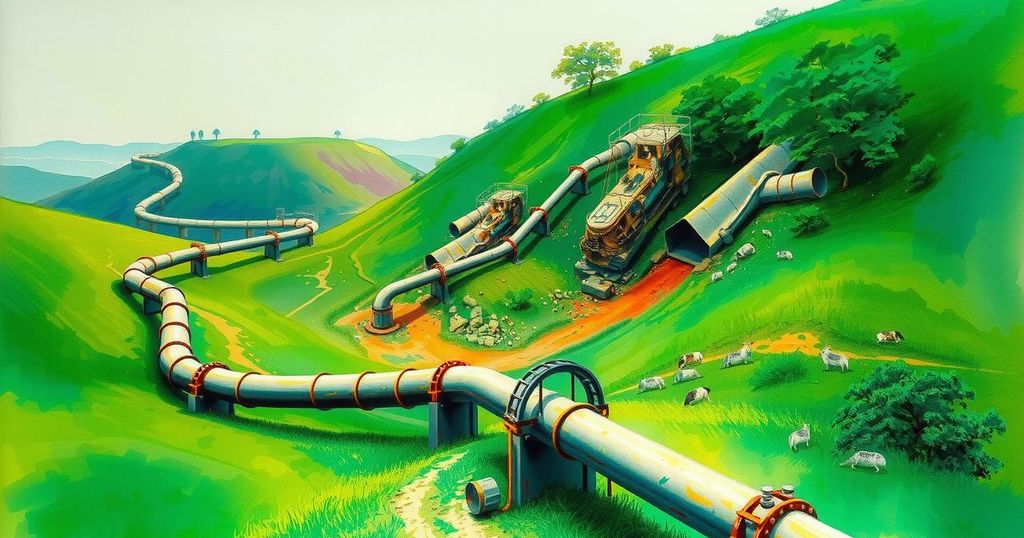Nigerian Oil Pipeline Sabotage Intrudes on Production Recovery Efforts

Nigerian oil production revival efforts are threatened by pipeline sabotage, jeopardizing investment and recovery. President Tinubu’s state of emergency in Rivers State addresses political instability and heightened vandalism, impacting oil exports and local governance. Industry players like Renaissance Africa Energy face challenges amidst ongoing security concerns.
Nigeria’s efforts to revitalize its oil production and attract investment are jeopardized by sabotage incidents affecting its key crude pipeline system. This comes in the wake of improved security measures that facilitated a 40% recovery in oil output, which had previously plummeted to just over half of its historical peak. Notably, in January, Nigeria even surpassed its long-standing OPEC production quota, marking a significant turnaround in its oil sector.
A recent act of vandalism on the Trans-Niger Pipeline, responsible for transporting approximately 15% of Nigeria’s crude exports, poses a critical setback. President Bola Tinubu declared a state of emergency in Rivers State, attributing the ongoing sabotage to a political stalemate among local officials that hindered effective action against militant activities.
Clementine Wallop, director for sub-Saharan Africa with Horizon Engage, remarked that this vandalism contradicts the Tinubu government’s recent oil production successes achieved through enhanced security measures, potentially deterring future investments. Despite these challenges, Renaissance Africa Energy, a consortium recently acquiring assets from Shell Plc, reports no plans to declare force majeure regarding Bonny Light crude exports, as two tankers await loading at the Bonny terminal.
In 2022, Nigeria’s security on the Trans-Niger Pipeline significantly deteriorated, with illegal taps occurring at approximately 150 points along the system, which affected output severely. Interestingly, tightened security on oil pipelines has led thieves to shift their focus toward gas conduits. However, the resurgence of these sabotage acts represents substantial challenges for Nigeria, a country heavily reliant on oil and gas revenues, which constitute nearly half of its budget.
Political instability, exacerbated by the emergency declared by President Tinubu, adds to uncertainty in Rivers State. Conflicts arose post-2023 elections between Governor Siminalayi Fubara and his predecessor Nyesom Wike, leading to factions that pose a risk of violence. Wallop suggested, “Against that backdrop, we see scope for further near-term unrest.”
Recently, the highest court in Nigeria determined that Fubara governed illegally without a supportive majority of legislators, causing heightened tensions by instructing the central bank to withhold a portion of oil and gas revenues. In response, President Tinubu suspended Fubara and his deputy for six months and appointed a retired military administrator to ensure governance in the state.
Renaissance has initiated an investigation into the recent vandalism. While they opt not to declare force majeure, their management of the infrastructure damage represents a vital first challenge for the consortium. Mansur Mohammed of Wood Mackenzie Ltd. noted, “The approach Renaissance takes will be crucial in setting the tone around how the above-ground challenges in Nigeria’s oil and gas sector will be resolved by the indigenous operators.”
In conclusion, Nigeria’s efforts to revive its oil production face serious threats due to recent acts of sabotage on critical pipeline infrastructure. The declaration of a state of emergency highlights the ongoing political instability that compounds security challenges. Notable industry players such as Renaissance Africa Energy face important challenges as they navigate the landscape shaped by vandalism, while the overall economic reliance on oil revenues requires immediate and effective resolution of these issues.
Original Source: www.rigzone.com








